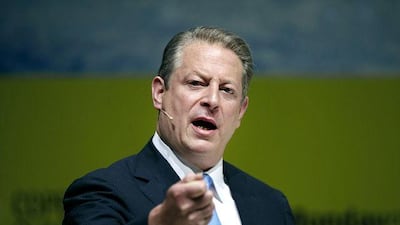BEIJING // The fate of two American journalists imprisoned in North Korea was further complicated this week as the UN Security Council imposed punitive sanctions on the country for its recent nuclear test and missile launches, and US president Barack Obama reiterated his commitment to not engage in direct talks with Pyongyang. US officials have stated that the harsh prison sentences were a ploy to leverage the US to veto UN sanctions, a strategy that apparently has failed as Resolution 1874 was passed last Friday. According to analysts, the release of apparently self-incriminating evidence from the trial was a response to Washington's tough line. Departing from its usual curtness, the state-run Korea Central News Agency (KCNA) on Tuesday detailed that the pair admitted they entered North Korea illegally and confessed to "hostile acts" against the country. The two American women, Laura Ling, 36, and Euna Lee, 32, both journalists for San Francisco-based Current TV, were last week sentenced to 12 years of hard labour in North Korean jails. According to the released trial details (although they are impossible to independently confirm), while crossing the China-North Korea border, the pair recorded a video-taped statement that was later confiscated by North Korean security officials in which they said, "We've just entered North Korean territory without permission." The women also pocketed a "souvenir" pebble from North Korea, according to KCNA. The increasingly firm stances taken by North Korea and the US are likely to delay their release, observers say. "The detention of the pair will likely become a long-term ordeal unless the US sends a special envoy," said Yang Moo-jin, a professor at the University of North Korean Studies in Seoul. In the past, the US was able to secure the release of its citizens who became hostages in North Korea by sending a special envoy, a move that the Obama administration has not yet shown signs of making. Observers in China, North Korea's strongest ally, are also pessimistic about an immediate release of the pair. "The chance is slim for now. North Korea and the US are in the midst of a confrontation. And the tension is too high," said Liu Ming, the director of International Relations Theory Studies at the Shanghai Academy of Social Sciences. Although Washington has said it would employ "all possible channels to secure their release", as Hillary Clinton, the US secretary of state, put it, it is not clear how the Obama administration will reach that goal, as analysts point out there is still heated debate in Washington about the best potential envoy. Some administration officials are reportedly opposed to the idea itself, saying doing so would play into the hands of North Koreans who want to "politicise" the humanitarian issue and extract political concessions from Washington. So far, among the most promising candidates for the task is the former US vice president Al Gore. "Everyone is talking about Al Gore. But I am a little bit sceptical," said Brian Myers, an American who teaches North Korean political history at Dongseo University in South Korea. Mr Myers pointed out the case of the former president Jimmy Carter, who went to North Korea in 1994 as an envoy. Despite his seniority, some critics said Mr Carter did not achieve much in putting the lid on North Korea's nuclear ambitions. Mr Myers also said the US had made serious missteps in its handling of the journalists' case. "I think it was unwise for the [US] state department to criticise their detention too quickly and publicly. They made it difficult for North Korea to reach some kind of compromise." Mr Gore himself has been aware of the increasing expectations placed on him. Last month, he met with Mrs Clinton, requesting he be sent to secure the release of the two American women, according to Selig Harrison, director of the Center for International Policy's Asia Program, in congressional testimony on Tuesday. The Obama administration has yet to approve the request. For North Korea's part, it reportedly has its own misgivings about Mr Gore. "At first, North Koreans expressed that they liked Al Gore, but later they changed their mind. Now they want someone from the current Obama administration," Mr Yang said. Despite the hand-wringing, Mr Liu believes the US will eventually settle for Mr Gore as its envoy. "Gore is likely to go. He fits the profile of an ideal candidate for the task because he doesn't have to represent the US government. The two journalists also work for Current TV, co-founded by Mr Gore. They are also from California so ? the California governor, not the US government, [can send] him to North Korea as well, making it look less official." The dominant view among analysts is that the Obama administration will face increasing domestic pressure to secure the release of the detained Americans and therefore will approach North Korea on the issue, at the very least through backchannel talks. slee@thenational.ae

Sanctions cast shadow over jailed Americans
Reporters sentenced to 12 years' hard labour in North Korea face an uncertain future as the diplomatic row over nuclear testing intensifies.
Most popular today
